Housing Rental Prices in Zagreb Down 20%, Sales Halt
ZAGREB, April 1, 2020 - The coronavirus and recent strong earthquakes in Zagreb have led to a fall in rental prices in the capital of up to twenty percent while sales have slowed down drastically, the Večernji List daily reported on Wednesday.
There are some prospective buyers however their contact is mostly over the phone and of an informative nature, one realtor told the daily.
Before the outbreak of the epidemic, real estate prices in Zagreb and along the Adriatic coast were increasing by about 10% a year however that trend will temporarily be suspended. No one can be certain how much prices will fall, the daily said.
"We expect real estate prices to fall but it is difficult to estimate just how much. As soon as uncertainty grows, buyers and banks are more cautious," said Chief Economic Consultant at the Croatian National Bank Vedran Šošić.
There is a risk that salaries will fall, banks will see which activities are requesting loans and whether their employer has been affected and to what extent. People, said Šošić, are focused on more fluid assets.
The centre of Zagreb and environs have been affected by the 22 March strong quakes. According to the city's authorities 7,000 buildings were damaged in the earthquake and about 30,000 family homes.
More Zagreb news can be found in the Lifestyle section.
Foreigners Self-Isolating in Croatia: Do You Feel Safer? Steve from UK in Vinkovci
March 31, 2020 - Do foreigners in Croatia feel more or less safe sitting out COVID-19 here than in their home country, and what are their experiences? A new series on TCN, starting with Steve Gaunt from Leeds in the UK, currently holed up in Vinkovci.
Oxford University recently published some research on government responses to coronavirus which showed that Croatia currently has the strictest measures in the world. While inconvenient, this is a good thing in terms of reducing the spread of the virus, and I am certainly not alone in my admiration of the official Croatian handling of this crisis in recent weeks, both in terms of action and communication.
But what do other expats here think? And how does it compare with the response in their home country? Would they rather sit this one out here or there? In the first of a new series on TCN, we will be featuring expats from all over the world to see what their views are on life in corona Croatia rather than back home. Having started with an excellent contribution from Romanian Mirela Rus and American/Irishman Jason Berry in Split, we move to an English pub in a field in the middle of nowhere near Vinkovci in eastern Croatia to see how things are with Yorkshireman Steve Gaunt from Leeds.
If you would like to contribute to this series, full details are below. Now, over to the one and only Steve Gaunt.
Firstly, how are you? Are you alone/with someone? Tell us a little about your situation and sanity levels.
Well, I have a large family, my wife and six children and all but one are with me. I am a very flexible person when it comes to change around me; I may not like it, but I can certainly deal with it. I have always dealt mentally with problems with humour, but there is little humour to find in the current situation.
The biggest problem is how it is affecting my children, especially those who should be at University in Zagreb. My daughter Emma doesn't know what the state of affairs is regarding her apartment in Zagreb after the earthquakes, and she and my son Daniel are finding it difficult to proceed with online studies as they have no access to their books, notes and other material. Luckily we all have access to computers so the younger children can still keep up with school work online. My wife Dragica works for the Red Cross and is allowed to move freely.
I admit I was confused and annoyed when restrictive measures came into force one after another, but I am much more at ease with them now than I thought I would be. We had a problem that my son Daniel was stranded in a village not too distant and couldn't come home.
You asked how we deal with "self-isolation" but the fact is we are not doing anything different other than what is forced upon us, like the schools being closed or businesses being shut down.
I can still travel to my land in a nearby village without hindrance and I can work on my land and enjoy a beer in my pub. I also have a pass which was very easy to procure and can travel a little further afield. I also got a pass for son Daniel so he can now return home should he wish, but he still hasn't. I see very few people about town but many in the countryside, walking, jogging, riding, biking and I feel they are absolutely right to do so; nobody should be isolated by walls, they should be in the fresh air and sun, isolated only by natural space. But the easy to follow basic rules should always be adhered to.
On my land it is rare to see more than one or two people passing each day, nowadays dozens come by each day. People are sociable animals, and it is comforting to see people passing by and enjoying the fresh air and greeting each other (though at a safe distance!). In the town it is different, the few people who venture abroad scurry about with their masks on, trying to avoid each other. Depressing to witness.
What do you think about the economic measures the government is taking, are they helping your business?
As an army invalid and pensioner, this doesn't really apply to me, though it doesn't stop me from being concerned. Croatia has never had the best economy, though we seemed well blessed by having a stable currency. I worry about small businesses and their ability to ride out this period of inactivity, but Croatians know how to deal with serious problems as the Homeland War showed.
When did you realise that corona was going to be a big issue?
I realised quite late. I am used to seeing news predicting or discovering potentially disastrous calamities. Swine Flu, Bird Flu, Global Warming caused freak weather and more. The media loves a good disaster, so I took it all with a pinch of salt. I wasn't even concerned with the spread patterns and actually became less concerned when it was revealed that the virus wasn't airborne. But the daily death toll in neighbouring Italy really put things in perspective for me.
My son Paul and I succumbed to a nasty case of flu in early February. It passed quickly for him but laid me low for three weeks. Comparing the symptoms then to the symptoms known today for the Covid virus, I see they were very similar. I wasn't concerned at the time but if this flu attack had have happened now, I admit I would be very frightened. I take it seriously. If I catch this virus, I know it will kill me.
What is your impression of the way Croatia is dealing with the crisis? How safe do you feel?
I feel safe enough, though I take care. Not to the ridiculous extent that some citizens have, like locking themselves in their homes, but enough to avoid any situation that could infect me or my family. Croatia is a country used to doing what it is told and the measures placed upon the populace through repressive are effective. Nobody seems to be complaining. The virus came to us locally recently and that caused anger more than pity, that the carrier could have been so careless. There is little more the authorities can do and hopefully folk with tolerate the annoyances of restriction, but the question is, for how long?
There is one stage of regulation I will not conform with, however, and that is being forced to wear a mask.
Now compare that to your home country and how they are handling it. What is Croatia doing better/worse?
Well that is an easy question, Croatia is doing very well, not just the authorities but the general population. I sometimes think Croatians welcome a crisis, just to show how they can deal with it and rise above it.
What about official communications from the authorities, compared to your home country?
I cannot speak for the UK as I have no information regarding offical communication. But here it is endless. It is this continuous barrage of news, information, warnings and instructions that worry me more than the thought that the virus could affect my family and friends. There is literally nothing else on the News. The Zagreb earthquakes crept in for a while on a national level, though friends and family in the UK had no idea of the disaster.
What's the one thing you wish you had taken with you into self-isolation?
As I said earlier, our isolation is natural or forced on us by circumstance. I can't go for a beer in a bar or to a restaurant for a meal, but then I didn't do that very much before. I can still travel a little, buy fuel, metal detect, cut the grass, prune my apple trees. The TV works and I have my books and my web sites to manage. I am actually more active than normal. If I was in total lockdown, I cannot think of a single thing I would take with me, other than prescibed medicine.
One thing you have learned about yourself, and one thing you have learned about others during this crisis.
That I am less selfish than I thought. I reserve comment on others.
Thanks Steve, stay safe and see you on the other side. You can learn more about Steve and how he came to open a pub in the middle of nowhere here.I am sure he will be glad of the company when this is all over, but at the moment there is a typically welcoming message from Yorkshire on the board at the moment (see below).
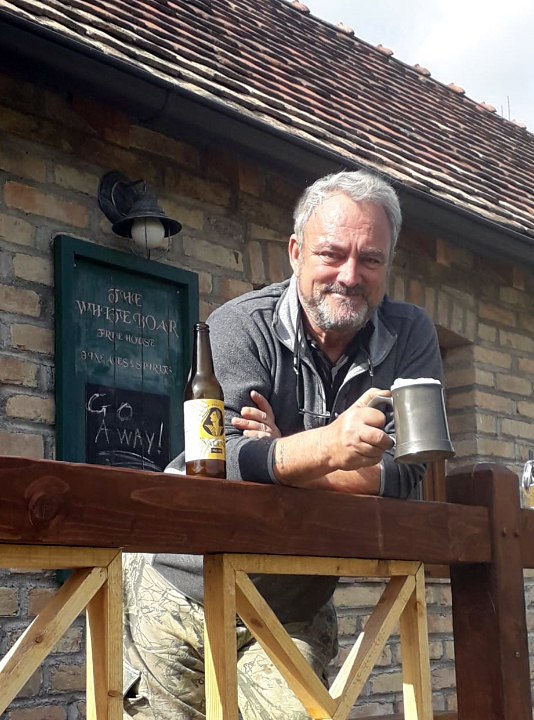
You can find more foreigner corona stories in our dedicated section here.
TCN is starting a new feature series on foreign experiences of sitting out covid-19 here in croatia compared to their home country. If you would like to contribute, the questions are below. Please also include a para about yourself and where you are from, and a link to your website if you would like. Please also send 3-4 photos minimum to This email address is being protected from spambots. You need JavaScript enabled to view it. Subject Corona Foreigner
If you would be interested to record a video version for our partners www.rplus.video please let us know in the email. Thanks and stay safe.
Foreigners Self-Isolating in Croatia: Do You Feel Safer Than in Your Home Country?
Firstly, how are you? Are you alone/with someone? Tell us a little about your situation and sanity levels.
What do you think about the economic measures the government is taking, are they helping your business? (PLEASE IGNORE IF THIS DOES NOT AFFECT YOU)
When did you realise that corona was going to be a big issue?
What is your impression of the way Croatia is dealing with the crisis? How safe do you feel?
Now compare that to your home country and how they are handling it. What is Croatia doing better/worse?
What about official communications from the authorities, compared to your home country?
What's the one thing you wish you had taken with you into self-isolation.
One thing you have learned about yourself, and one thing you have learned about others during this crisis.
TCN has recently become a partner in Robert Tomic Zuber's new R+ video channel, initially telling stories about corona experiences. You can see the first TCN contribution from this morning, my video from Jelsa talking about the realities of running a news portal in the corona era below. If you would like to also submit a video interview, please find Robert's guidelines below
VIDEO RECORDING GUIDE
The video footage should be recorded so that the cell phone is turned horizontally (landscape mode).
There are several rules for television and video news:- length is not a virtue- a picture speaks more than a thousand words
In short, this would mean that your story should not last more than 90 seconds and that everything you say in the report should be shown by video (for example, if you talk about empty streets, we should see those empty streets, etc.).
How to do it with your cell phone?First, use a selfie camera to record yourself telling your story for about a minute and a half. Ideally, it would be taken in the exterior, except in situations where you are reporting on things in the interior (quarantine, hospital, self-isolation, etc.). Also, when shooting, move freely, make sure everything is not static.
After you have recorded your report, you should capture footage that will tell your story with a picture, such as an earlier example with empty streets.
One of the basic rules of TV journalism is that the story is told in the same way as a journalist with his text. Therefore, we ask you for additional effort. Because we work in a very specific situation, sometimes you may not be able to capture footage for each sentence of the report. In this case, record the details on the streets: people walking, the main features of the city where you live, inscriptions on the windows related to the virus, etc.
The same rules apply if you are shooting a story from your apartment, self-isolation, quarantine. We also need you to capture footage that describes your story.
When shooting frames to cover your reports, it is important that you change the angle of the shot (in other words, shoot that empty street from several angles). Also, when shooting a detail, count at least five seconds before removing the camera to another detail.
The material should be about 5 minutes long (90 seconds of your report + frames to cover your story).
After recording everything, send us to Zagreb, preferably via WeTransfer to This email address is being protected from spambots. You need JavaScript enabled to view it.
Split Fish Market Celebrates 130 Years with First Closure in History
April 1, 2020 - On Tuesday, March 31st, the Split fish market celebrated its 130th birthday.
The special birthday was welcomed closed, for the first time in history, a scenario that only a few could have imagined just a few weeks ago.
Slobodna Dalmacija writes that while we can no longer buy fish here, for the time being, we can talk about the importance of this Art Nouveau building, as well as the long traditions of the city related to the catch and sale of seafood.
Although not much attention was paid in official documents, the sale of fish and Split coexist, and even during the greatest crises, famines and wars, fish was on the local’s menu.
The first official record of the sale of fish in Split was found in the City Statute of 1312, in the section dealing with animals and products of animal origin. It states that “fishers must sell fish the day they arrive at a town port, in a fish market and not elsewhere. Types of sea bream were sold at eight dinars, Jack mackerels at two, tuna at three, mackerel at two, and all other fish at two dinars per libra. If the fishermen were to arrive at the harbor in the afternoon, he would have to bring the fish to the square early in the morning and sell it as said. "This is how it reads in the fourth book of the Statute, Chapter 116.
The Reformation Book states that "everyone who brought fish by sea or land to the city of Split or its district, so that he sold or carried it home, had to pay an eighth part, which they were obliged to pay anywhere they sold fish, both in and out of the Split district, and whether it was transported by boat or not.”
The rules, therefore, were very well known, as were the prices. With the fall of Dalmatia under Venice in 1409, the Venetian Republic on the eastern Adriatic Coast put fishers and fishing revenues under their control. Due to catches and fishing areas, mutual conflicts between Dalmatian communes were recorded. The Austrian Empire continued to bureaucratize and abandon fisheries. According to the "Statistical Notes on Dalmatia", published in Vienna in 1818, fisheries are said to have once flourished and then declined because of the Venetian levies and other circumstances as fisher's income had decreased.
In the paper "Fisheries of Dalmatia in the 19th and 20th Centuries", by Điva Bašić, we learned about the average catch of the Split area, which in 1830 was 22,800 barrels of bluefish, 17,000 barrels of grey mullet, and about 220,000 of other fish. Fishing in Dalmatia three years later, during the summer and autumn, brought 20,576 thousand pieces of all kinds of fish, but the low price brought only a meager profit. As far as sales are concerned, it took place only at fish markets, which in Split, were in the city squares and on the waterfront, though it wasn't a profitable job.
The "fisherman's wife, eager for all the good" was a proverb that could not be easily eradicated in Dalmatia. At the end of the 19th century, the modern fish market was erected in the city, the one we use and are proud of today.
At the end of the last century, more precisely in 1890, according to the decision of architect Ante Bezic, a Solta native from Grohot, the Split fish market was built right next to the sulfur spa, which significantly contributed to the creation of its recognizable image as one of the few fish markets in the world without flies. Professor Frano Baras wrote that on March 31, 1890, at exactly 11 am, in the presence of municipal deputies and the general population, after the blessing of the canon of Dvornik, the new fish market was opened to the public by the Mayor, Gajo Filomen Bulat. It was the first public building to be built by the new Croatian municipal administration. "You almost don't believe your eyes that such a big and tidy fish market could have come out of this old and gross enclosure,” historical sources said.
Under the design and supervision of the municipal technician Ante Bezic, the works began in July 1889. They were performed by the entrepreneur Ivan Celić. Due to technical difficulties, primarily around the skylight and hydrants, the works were completed in eight months. Meanwhile, fish were being sold on the benches in front of the monastery of St. Frane.
"Smooth stone tables lined up, a flat and mastered tiled floor, convenient faucet for washing fish and pumping water, beautiful iron door work by local artisans, and solid iron columns resting on a beautiful iron roof with glass openings, matching window panes - all this represents a harmonious perfect unit that you would not have hoped in the construction of this kind from afar,” the journalists wrote at the time.
Special praise went to the expense of the three iron gates, which were claimed to be incredibly low cost, and made by the valuable blacksmith Lovro Aržić. Split was thus awarded a fish market according to "all the requirements of taste, order and cleanliness", one which were envied by much larger and more advanced cities. For the then 15,500 inhabitants, 30 outlets were erected at the fish market. It is known that the main sulfur springs are located at the site of the Obrov fish market. In the southwestern part of the building is a larger source of sulfur water, which was then used for the Split spa with galvanized pipes.
As the city grew, it was thought that the fish market should be larger, so in 1939 there was talk of "the need to build a bigger fish market three times the size“ at Matejuska. But World War II put an end to such dreams. Despite its long tradition, it is interesting to see how, on the eve of the war, the annual fish consumption in Japan was 45.5 kilograms per capita, in England 13.5, in Germany 9.5, in France 7.5, in Italy six, and the then Kingdom of Yugoslavia only half a kilo per capita.
It should be said that the new building delighted the citizens, and today the Secession building is admired mainly by tourists. In the bombing of the town on June 3, 1944, most of the Vidović house was demolished with the front-facing Marmontova Street, and after the rubble cleared in 1955, outdoor sales began. After three years, that is, in 1958, a famous and popular favorite market place was set up on the west side of the fish market. Lately, however, fish may only be sold indoors.
During the 1990s, the fish market was closed for about a year because it was being renovated. Sales were not suspended, but then moved to Morpurgo Field. Stands were set up and fish were offered to citizens every day, revealed Tvrtko Karoglan, director of Hippos, a concessionaire of the Split fish market.
The coronavirus pandemic has now stopped sales, but it's clear fishers and sellers can't wait to get back to their stands. The Split fish market is undoubtedly one of the most picturesque symbols fo the city, and today it is protected cultural property.
To read more about lifestyle in Croatia, follow TCN's dedicated page.
Foreigners Self-Isolating in Croatia: Do You Feel Safer? Jason from Ireland/USA
March 31, 2020 - Do foreigners in Croatia feel more or less safe sitting out COVID-19 here than in their home country, and what are their experiences? A new series on TCN, starting with entrepreneur Jason Berry from Ireland/USA, currently holed up in Split.
Oxford University recently published some research on government responses to coronavirus which showed that Croatia currently has the strictest measures in the world. While inconvenient, this is a good thing in terms of reducing the spread of the virus, and I am certainly not alone in my admiration of the official Croatian handling of this crisis in recent weeks, both in terms of action and communication.
But what do other expats here think? And how does it compare with the response in their home country? Would they rather sit this one out here or there? In the first of a new series on TCN, we will be featuring expats from all over the world to see what their views are on life in corona Croatia rather than back home. Having started with an excellent contribution from Romanian Mirela Rus in Split yesterday, we move across the Dalmatian capital to see how Jason Berry, an entrepreneur from Ireland/USA, is faring.
If you would like to contribute to this series, full details are below. Now, over to the one and only Jason Berry.
Firstly, how are you? Are you alone/with someone? Tell us a little about your situation and sanity levels.
Thanks for asking. We're all healthy. All our friends are healthy. All our family are healthy so all good in that department. My wife and I decided (she decided) to divide and conquer. She has taken the two kids down to baba and dide's in the smallest most famous town on the Makarska Riviera, Drasnice. The kids have a huge house and yard to play in and lots of space empty of people. There are only 200 people in the village so its very well isolated and sparsely populated, all good for isolation. So by dividing, I am living the bachelor life of a single man in isolation: movies, video games, reading, and the kids have been busy conquering my poor wife, running her off her feet.
I am up in Split working from home and drive down the Magistrala coast road through three checkpoints to visit them each weekend.
I am a director of a securities trading firm with offices in Dublin and Croatia. I am mostly trading the financial markets, and not doing much directoring as most people are working from home.
Our Dublin office is completely shut down and all people are working remotely. Our Croatia office has a skeleton crew of only 4 in the office and everybody else is remote.
We have a front row seat to the craziness of the markets caused by Covid-19 over the past few weeks, which has given us a greater sense of urgency as to the seriousness of the virus' impact on the global economies. We were watching first hand as the markets collapsed, erasing the gains of the past decade in a matter of days. Terrifying volatility. Our business is inversely correlated with the normal business cycle. We are least busy when the markets are going up and incredibly busy when markets are going down. So in terms of work, we've been run off our feet. The US markets open around midnight on Sunday night, and on the last three Sundays I've worked more or less straight through from midnight on Sunday til midnight on Monday with a few naps. The whole firm is more or less doing the same thing. Strange times.
When did you realise that corona was going to be a big issue?
We realized pretty early on as it started to leave China. Like I mentioned above, the markets were reacting to the seriousness of the situation even if most politicians and the public were not. So we made preparations for the business and for the family the first week of March and went into isolation shortly thereafter. We were fortunate to be able to see the market indicators about how serious this was going to be. But the last week of February we had booked to go skiing in Italy. All the guys were being all macho and saying, no big deal, all the women were saying cancel cancel. In the end, we cancelled as it became clear how serious the disease was spreading.
What is your impression of the way Croatia is dealing with the crisis? How safe do you feel?
I feel very safe compared to how they are handling it in the US. I feel China handled it better and Germany is testing tons. I wish Croatia was testing more. But there are relatively few tourists here in the winter so we are fortunate. There are a lot of workers that go to Italy and Austria, and a few who travel for skiing and such, but otherwise I feel pretty well isolated.
Croatia's daily communication from the Health Minister has been great. The Viber messages are great too.
Split people following the government's orders in the beginning were disgraceful. People were out playing bocci ball, hanging in cafes in big groups, drinking on the wall in the local neighborhood, pretty much ignoring the whole social distancing thing. But then after the earthquake and ban on travel, everybody got the message. The police should have been out enforcing the self-distancing stuff earlier.
The numbers are low in Croatia. Now I don't know if that is because Croatian health service is kicking ass and is well prepared or that we got lucky. People tell me that the health service is well organized. It helps a lot having a centralized health system. It's probably a little of both.
Now compare that to your home country and how they are handling it. What is Croatia doing better/worse?
Compared to Ireland, Croatia is about the same, a little less strict, with similar results. The Irish will struggle because they travel so much and people travel to Ireland at all times of the year, but Jan and Feb is the slowest time.
Compared to the US, Croatia is heaven. The US is in for a serious dose. They have handled it almost as badly as you could, denial, denial, oh shit. Trump said it at the start of his presidency, US will be number 1. It's a funny joke but things are going to get really bad over there. The US doesn't have centralized medical systems or universal health insurance, and they have a leader who denied it was coming. All those things will add up to some serious problems in the next month, unfortunately.
What about official communications from the authorities, compared to your home country?
Health boss Vili seems to be no BS, all the facts, straight-shooting, and spot on. He even has an accent I can understand! Bonus. His daily briefings and Viber have been great. The police at checkpoints, however, have a mix of masks and no masks. People on the street seem to be wearing masks against all advisories so not all messages are getting through on how to handle precautions.
What's the one thing you wish you had taken with you into self-isolation.
Food. I laughed at all the hoarders going out and panic buying stuff. Now I can't find a store open past 5pm and Konzum's delivery service is all jammed up. But that just means I don't cook and order a ton of Wolt: sushi, poke bowls from Maka, Zora Bila, Mexican from To je Tako, and desserts from The Cookie Lab. I'm going to be enormous when the isolation ends.
One thing you have learned about yourself, and one thing you have learned about others during this crisis.
It is a crisis but it is not. If you do what you are supposed to, it is just like a series of rainy days. The risk is relatively low. I work. I come home. I watch too much TV, play too many video games, and don't read enough. So I don't panic or maybe I just have too much faith in the things I expect will continue working. I don't panic so I've got fairly low stress so far. I don't panic so I have no food in the house. But to be honest, so far so good. We're all healthy. I can do my job at home very easily. So we are quite fortunate and so far for me and my family its just been an inconveniece. I know that is not the scenario for everybody else.
The only big regret I have right now and probably the thing that has been worrying me the most is that I have two teenagers from Dom Maestral that I hang out with and I haven't been able to see them for like a month. We touch base on WhatsApp and I check in, but that is about all we can do until it ends. They are under lockdown and so am I. That is a real bummer.
Thanks Jason, stay safe and see you on the other side. You can learn more about Jason and his life in Split from this earlier feature story on foreign entrepreneurs in Croatia.
You can find more foreigner corona stories in our dedicated section here.
TCN is starting a new feature series on foreign experiences of sitting out covid-19 here in croatia compared to their home country. If you would like to contribute, the questions are below. Please also include a para about yourself and where you are from, and a link to your website if you would like. Please also send 3-4 photos minimum to This email address is being protected from spambots. You need JavaScript enabled to view it. Subject Corona Foreigner
If you would be interested to record a video version for our partners www.rplus.video please let us know in the email. Thanks and stay safe.
Foreigners Self-Isolating in Croatia: Do You Feel Safer Than in Your Home Country?
Firstly, how are you? Are you alone/with someone? Tell us a little about your situation and sanity levels.
What do you think about the economic measures the government is taking, are they helping your business? (PLEASE IGNORE IF THIS DOES NOT AFFECT YOU)
When did you realise that corona was going to be a big issue?
What is your impression of the way Croatia is dealing with the crisis? How safe do you feel?
Now compare that to your home country and how they are handling it. What is Croatia doing better/worse?
What about official communications from the authorities, compared to your home country?
What's the one thing you wish you had taken with you into self-isolation.
One thing you have learned about yourself, and one thing you have learned about others during this crisis.
TCN has recently become a partner in Robert Tomic Zuber's new R+ video channel, initially telling stories about corona experiences. You can see the first TCN contribution from this morning, my video from Jelsa talking about the realities of running a news portal in the corona era below. If you would like to also submit a video interview, please find Robert's guidelines below
VIDEO RECORDING GUIDE
The video footage should be recorded so that the cell phone is turned horizontally (landscape mode).
There are several rules for television and video news:- length is not a virtue- a picture speaks more than a thousand words
In short, this would mean that your story should not last more than 90 seconds and that everything you say in the report should be shown by video (for example, if you talk about empty streets, we should see those empty streets, etc.).
How to do it with your cell phone?First, use a selfie camera to record yourself telling your story for about a minute and a half. Ideally, it would be taken in the exterior, except in situations where you are reporting on things in the interior (quarantine, hospital, self-isolation, etc.). Also, when shooting, move freely, make sure everything is not static.
After you have recorded your report, you should capture footage that will tell your story with a picture, such as an earlier example with empty streets.
One of the basic rules of TV journalism is that the story is told in the same way as a journalist with his text. Therefore, we ask you for additional effort. Because we work in a very specific situation, sometimes you may not be able to capture footage for each sentence of the report. In this case, record the details on the streets: people walking, the main features of the city where you live, inscriptions on the windows related to the virus, etc.
The same rules apply if you are shooting a story from your apartment, self-isolation, quarantine. We also need you to capture footage that describes your story.
When shooting frames to cover your reports, it is important that you change the angle of the shot (in other words, shoot that empty street from several angles). Also, when shooting a detail, count at least five seconds before removing the camera to another detail.
The material should be about 5 minutes long (90 seconds of your report + frames to cover your story).
After recording everything, send us to Zagreb, preferably via WeTransfer to This email address is being protected from spambots. You need JavaScript enabled to view it.
Virtual Pazar Split Brings Together Producers, Sellers and Buyers on Facebook
April 1, 2020 - Shop at Split's famous green market online thanks to the new Facebook group Virtual Pazar Split.
Due to the coronavirus outbreak, the usually bustling outdoor markets are closed, the banks are empty, and only a few people can be found on the streets.
However, until things turn back to normal, we’ve discovered the beauty in the virtual world - and many small Croatian producers are getting the exposure they’ve never had before.
Namely, Slobodna Dalmacija writes that Pametno party member Marijana Puljak has done a great thing for both buyers and producers and sellers of fruits and vegetables at Split Pazar. Less than a week ago, she founded the Facebook group Virtual Pazar Split on Facebook, which already has over 8,000 members.
Due to the inflation of new members and offers, the group administrators introduced rules and asked everyone to adhere to them.
- We ask all sellers to include product prices with their offer in the announcements.
- Limit the number of posts to find everything you need as quickly as possible. If you need to change your bid or pricing, change your initial posts.
- This group serves to help each other overcome these difficult days, so keep decency and determination in communication with each other.
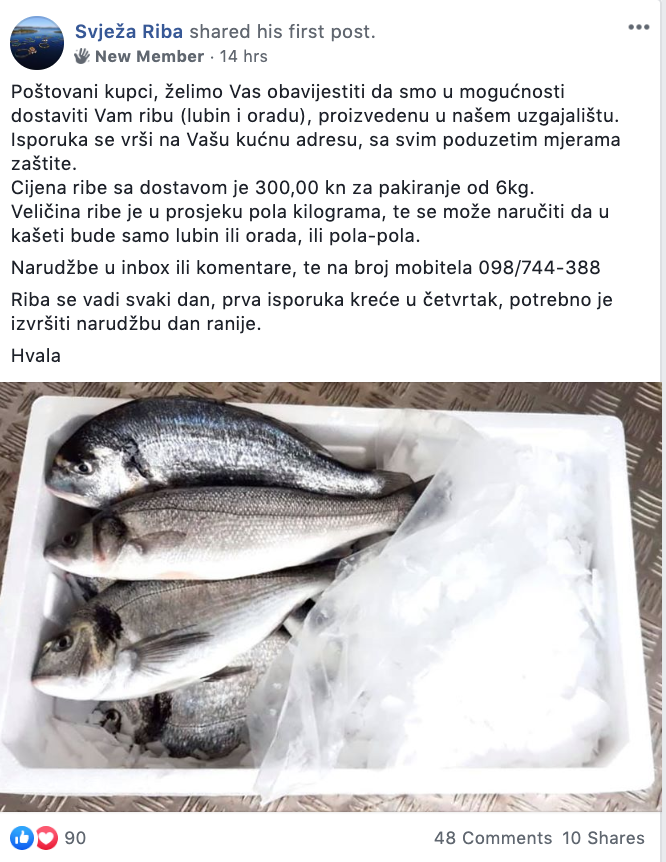
The idea, Puljak said, came from her Facebook friend Zoran Djurdjic, who pointed out to her that other cities are opening similar groups on social networks.
“We have seen that such groups work well, directly connecting small-scale producers of food production and home delivery with buyers who are mostly confined in their homes today. I searched for something similar for Split already and I couldn't find one. In less than 48 hours, we had over 5000 members, which is a real surprise to me. It shows that a platform like this was really needed. You can find producers of fruits and vegetables, butchers, fish markets, even sellers of flower and vegetable seeds,” says Puljak.
Puljak is pleased that she can help people follow the recommendations of the Civil Protection Headquarters to stay home, but have the opportunity to purchase quality products under these conditions.
“On the other hand, this helps producers market their goods during these times. The group is completely open to everyone and we invite everyone to take this opportunity to connect. Leave your comments, as you are satisfied with the service; this is the best way to support all those who do their job excellently,” said Puljak and concluded:
“Take care of yourself altogether and use #VirtualPazarSplit.”
It should also be noted that the administrators of this group, along with Marijana Puljak, are two other members of the Pametno party Branimir Urlic and Nenad Introic. You can join the group HERE.
To read more about lifestyle in Croatia, follow TCN's dedicated page.
Experience Zagreb County Virtually at Home with Online Tour
April 1, 2020 - Don't let your four walls keep you from experiencing the beauty in Croatia all around you. Take a virtual tour of Zagreb County!
At a time when self-isolation is needed, most of us have resorted to our trusty screens - and virtual walks have become a real hit.
While we’ve already told you all about virtual Croatian museums, did you know you could visit destinations virtually, too? In addition to panoramic cameras, some destinations, such as Zagreb County, also offer a virtual walk through the destination via social networks, reports HRTurizam.
In order to stay in touch with what awaits us and what we can look forward to after self-isolation comes to an end, the Zagreb County Tourist Board is promoting a virtual “experience” of its destinations and museums with the hashtag #TravelVirtually, #ostanidoma and #ExploreZagrebCountyOnline.
Thus, you can virtually walk through the municipalities and all nine cities in the county, as well as virtually visit all the museums in the Zagreb County area.
"Virtual walks have been around for a long time, and in these moments, they give us the safest path out of the isolation that has plagued us. Through a virtual walk, guests can see the attractions of Zagreb County through natural, historical, cultural and gastronomic sights from the comfort of their own home,” points out Ivana Alilović, director of the Zagreb County Tourist Board. Alilović added that this is an opportunity for those who may have never seen the beauties of the green Zagreb ring and, therefore, suggests that guests visit it all virtually.
You can see the virtual walkthrough Zagreb County here, while you can visit the virtual museums here.
Furthermore, it is great content for all accommodation and service providers in Zagreb County.
While it is not the best time to talk about tourism, it does not mean that you do not need to communicate. Under the mantra "Don't cancel your trip but postpone it”, or but telling travelers to explore their future trip, all tourism professionals can use this content to communicate on their social networks.
To read more about travel in Croatia, follow TCN's dedicated page.
No Surge in Coronavirus Cases After Zagreb Earthquake
ZAGREB, March 31, 2020 - Croatia's COVID-19 crisis management team said on Tuesday that there was no surge in the number of coronavirus cases that could be connected with the aftermath of the 22 March strong quake that hit Zagreb and its surroundings, claiming one life and causing extensive damage.
The head of the Croatian Institute of Public Health (HZJZ), Krunoslav Capak, told a news conference that first analyses did not show a higher number of new infections due to the developments in Zagreb on 22 March when larger groups of shocked people fled their buildings to be outside.
Broken down by age, of the total of 867 Croatians diagnosed with COVID-19, as many as 187 are aged between 50 and 59. They are followed by those aged between 40 and 49 (165).
In Croatia, 41 patients diagnosed with COVID-19 are under the age of 20, and 100 are above the age of 70, Capak said.
He informed the news conference that 50 doctors, 10 dentists, 41 nurses, five pharmacists and seven hospital administration staff were among the positive cases.
Also 1,200 employees in the healthcare system are in self-isolation.
More news about the earthquake can be found in the Lifestyle section.
Esplanade Zagreb Hotel Damaged in Earthquake
ZAGREB, March 31, 2020 - Esplanade Zagreb Hotel, one of the oldest hotels in Zagreb, is closed due to extensive damage caused by the March 22 earthquake, exacerbating the difficult situation concerning the coronavirus, which has been adversely affecting business since January, the hotel's managing director has told Hina.
"In the earthquake, the hotel suffered extensive damage, on the facade, on the floors, in public spaces, and in many rooms. Therefore, it's with a heavy heart that I decided to close Esplanade for the foreseeable future, as a precaution," revealed Ivica Max Krizmanić. He added that the last few guests had been evacuated and put up in other hotels in Zagreb, and that the staff, apart from a few who are taking care of the hotel, had been sent home.
Krizmanić added that a detailed inspection conducted by structural engineers established that the building was structurally sound due to the fact that the hotel was built as an exceptionally stabled, high-quality, and massive luxury building back in 1925.
However, Krizmanić noted that it would take a lot of time and money to repair the damage. The managing director remarked that the last large renovation took place 16 years ago, and that the biggest challenge in the renovation after the earthquake would be finding wallpaper, tiles, lamps, and decorations identical to the unique ones that were damaged in the earthquake.
When asked about the way they were coping with the coronavirus crisis, Krizmanić stated that they had closely followed developments since the epidemic broke out in China, the rest of the world, and in the region. Since the epidemic reached Croatia, they kept implementing stricter measures, from cleaning and disinfecting the hotel's public spaces and areas and implementing obligatory hand disinfection for guests and staff, to procuring masks, thermometers, disinfectants, and increasing caution in preparing and serving food, complying with mandatory distance, allowing work from home, etc.
"Esplanade is famous for its high standards and first-rate service in every segment of its business, which is confirmed by numerous certificates and strict standards for staff, and our guests felt safe the whole time. However, due to the earthquake, we had to close," Krizmanić said.
He emphasised that the hotel registered business disruptions as early as January, when the epidemic broke out in China, and that it was obvious even then that 2020 would be a very hard year for tourism.
More news about hotels can be found in the Travel section.
President Milanović Pays Tribute to Police Officer Josip Jović
ZAGREB, March 31, 2020 - President and Armed Forces Supreme Commander Zoran Milanović on Tuesday lit a candle at a monument at Plitvička Jezera commemorating Josip Jović, the first Croatian police officer killed in the Homeland War, on the occasion of the 29th anniversary of his death.
Milanović's envoy, Brigadier Darko Podrug, head of the Croatian Navy commander's office, laid a wreath at Jović's grave in Arzano.
Jović, 22, was killed and nine other police officers were wounded in a police operation on 31 March 1991 after Serb insurgents occupied the Plitvice Lakes National Park and blocked the D1 state road that connects the country's north and south.
Jović was a member of the Lučko Anti-Terrorist Unit.
Minister of the Interior Davor Božinović on Tuesday paid tribute to Josip Jović, the first Croatian police officer killed in the Homeland War, as well as to other police officers and soldiers killed in the 1991-95 war.
Božinović lit a candle at a monument commemorating Jovic at Plitvice Lakes on the occasion of the 29th anniversary of his death.
Božinović, who heads the national team managing the current coronavirus crisis, said that police, together with other services, were today on the first line of defence against coronavirus, just as they had been on the first line of defence during the war.
More news about the Homeland War can be found in the Politics section.
Foreigners Self-Isolating in Croatia: Do You Feel Safer? Mirela from Romania
March 31, 2020 - Do foreigners in Croatia feel more or less safe sitting out COVID-19 here than in their home country, and what are their experiences? A new series on TCN, starting with entrepreneur Mirela Rus from Romania, currently holed up in Split.
Oxford University recently published some research on government responses to coranavirus which showed that Croatia currently has the strictest measures in the world. While inconvenient, this is a good thing in terms of reducing the spread of the virus, and I am certainly not alone in my admiration of the official Croatian handling of this crisis in recent weeks, both in terms of action and communication.
But what do other expats here think? And how does it compare with the response in their home country? Would they rather sit this one out here or there? In the first of a new series on TCN, we will be featuring expats from all over the world to see what their views are on life in corona Croatia rather than back home. We start with our favourite Romanian in Croatia, entrepreneur Mirela Rus in Split, who was happy to share her thoughts.
If you would like to contribute to this series, full details are below. Now, over to the one and only Mirela Rus.
Firstly, how are you? Are you alone/with someone? Tell us a little about your situation and sanity levels.
Luckily, I am with my partner, Ionut (and our three cats), and we are actually used to spending 99% of our time together, we both worked pretty much from the house in the past 10-12 years. So the part about having to stay inside is not the hard one for us. The bonus is that we can sit on our terrace and calm down by looking at the sea in front of us (in the distance, but still, it is a sea view and that is one of the things I am so thankful for right now).
What drives us crazy though (and we are on a rollercoaster of emotions every day, like most, I suppose) is the uncertainty. Is our family going to be OK at the end of this? Are we gonna be OK?
We have two shops in Split, where we sell our own handmade nautical jewellery – a business totally dependent on tourism. We are closed now, and we do not know if we will be able to reopen in June, in August or at all this year. And if we are able to re-open, will Split still have tourists coming? And if we do have tourists coming, will they have enough money to spend on souvenirs anymore, after they themselves being in a crisis? So, basically, will our business survive this? And, if not, how will we be able to support ourselves here, where we have no family to rely on.
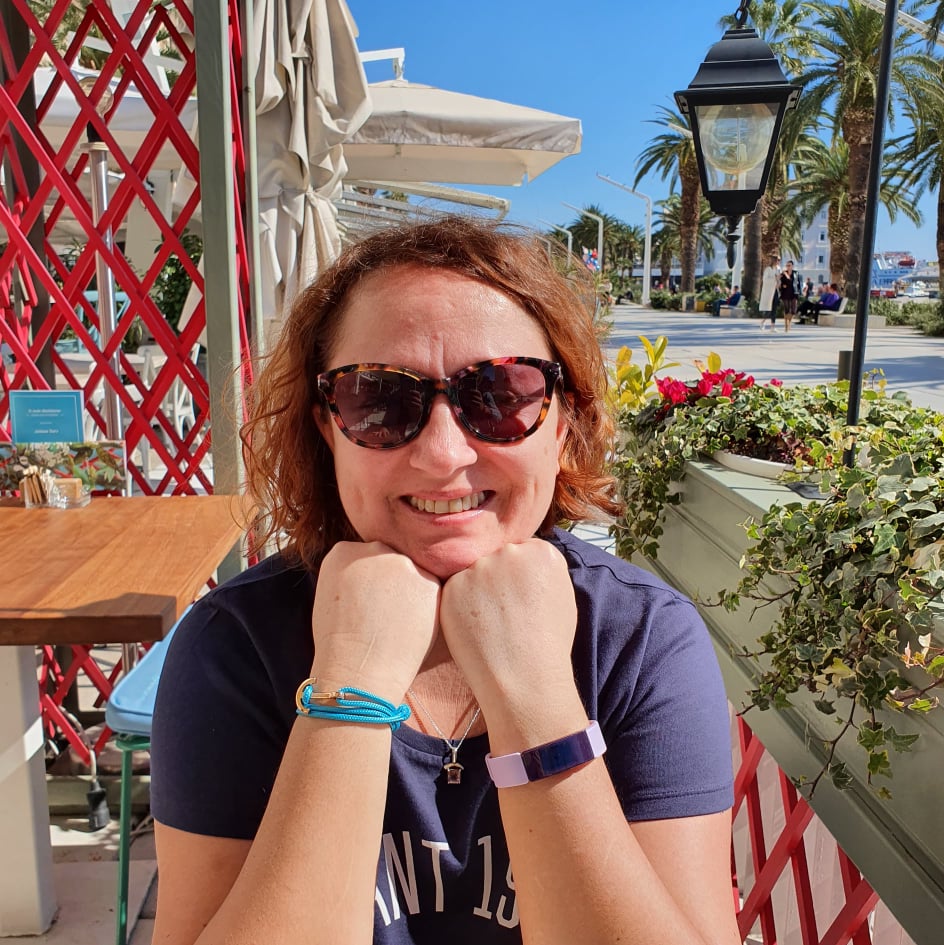
(Last day of freedom in sunny Split)
What do you think about the economic measures the government is taking, are they helping your business?
As a foreigner with not many local ties, finding out how to apply and what the conditions are for the measures that are already starting to be implemented, was the hardest part.
Thank you, actually, for putting me in contact with your TCN colleague Iva Tatic, who helped us apply for the 3250kn per employee (NB, if any other foreigner needs Iva's help, contact This email address is being protected from spambots. You need JavaScript enabled to view it. Subject Iva). We did not get a reply on that yet, and I was also disappointed to see that it does not apply for employees hired after 29.02. I think the date was arbitrary, it should have been the date before they announced the closing of all non-essential businesses. We currently have two employees (besides me and my partner) and we hired them on March 1st, when we reopened our shops (since our business is 100% seasonal) and we could not bring ourselves to fire them, once we had to close the shops. I think it is unfair that we cannot get this aid for them. Since we are willing to keep them on payroll three more months after these 3 months aid is done, I think we should be entitled to receive it.
Like everyone else, I also think the currently announced measures are far from actually helping too much. I would give 10 points to the administration for having the application process for tax deferral online and fast-tracked (we were approved in a day or so). But these taxes will still have to be paid, while we are not sure we will still have a business when this is over. I am hoping the new package Plenkovic announced for this week will be more in the line of what entrepreneurs are asking for. I was happy to see they have mobilized and are asking to have a voice in this. I do believe the economy minister should have already been replaced though.
When did you realise that corona was going to be a big issue?
Pretty early on, since I am used to following world news. I actually just looked at my Facebook post from January. I first got worried on January 14th, when the BBC announced the first case outside China.
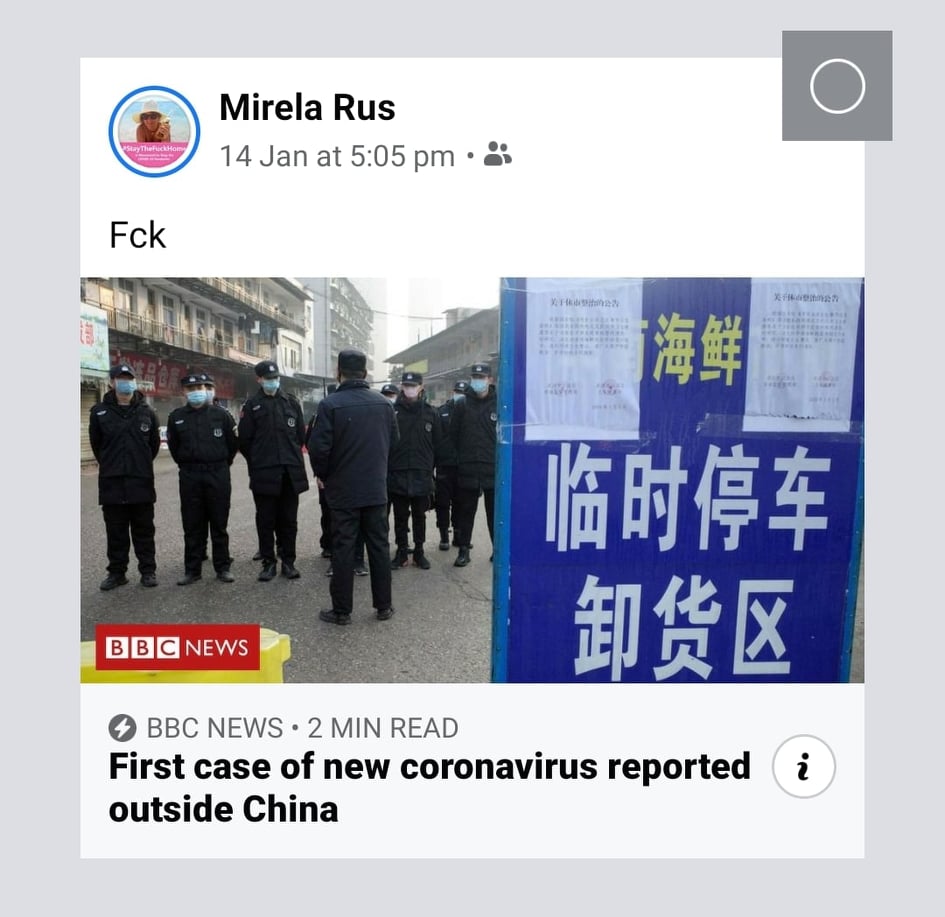
Then really worried and frustrated on January 26th, when a bus full of tourists from Wuhan (!!!) was allowed into Croatia like it was business as usual.
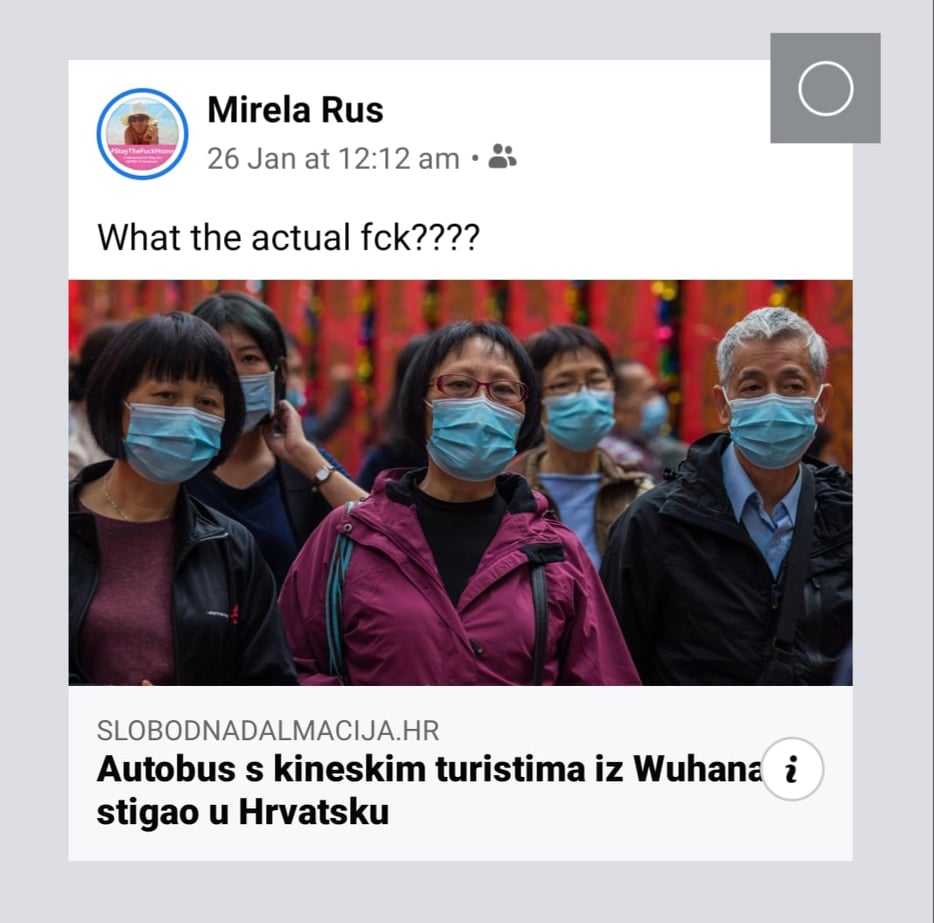
But the first REAL sign that this was not just some casual flu was, for me, on January 29th, when British Airways suspended all flights with China. That was something unprecedented which my former-journalist-mind perceived as confirmation of bad things to come.
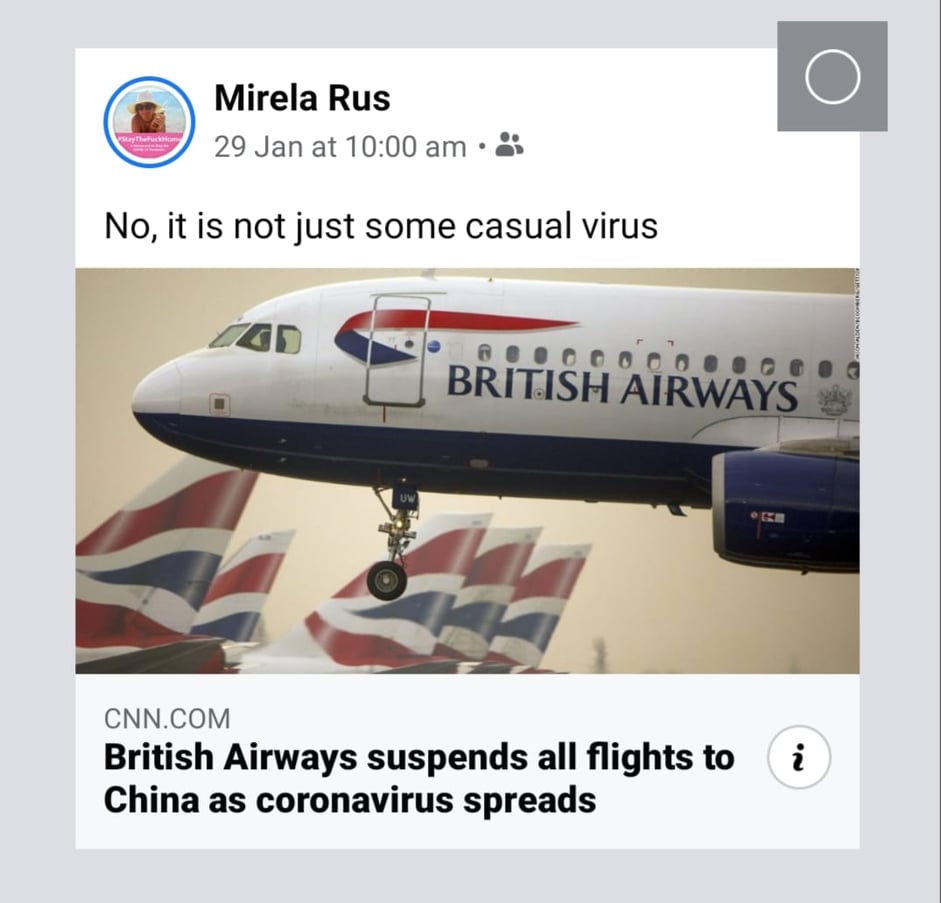
What is your impression of the way Croatia is dealing with the crisis? How safe do you feel?
Well, it all started pretty poorly. No Wuhan tourists bus should have been allowed in the country, but those were early days and I guess nobody wanted to believe this would turn out to be the pandemic scientists were warning us about for years. So – compared to what other countries were doing at the time – I cannot really blame Croatian authorities for not doing more.
But coming back to the present time, I feel safer here than I would feel anywhere else. I am VERY impressed on how authorities are now handling the crisis (and I would happily contribute to having a statue erected for Vili Beros and Alemka Markotic when this is over).
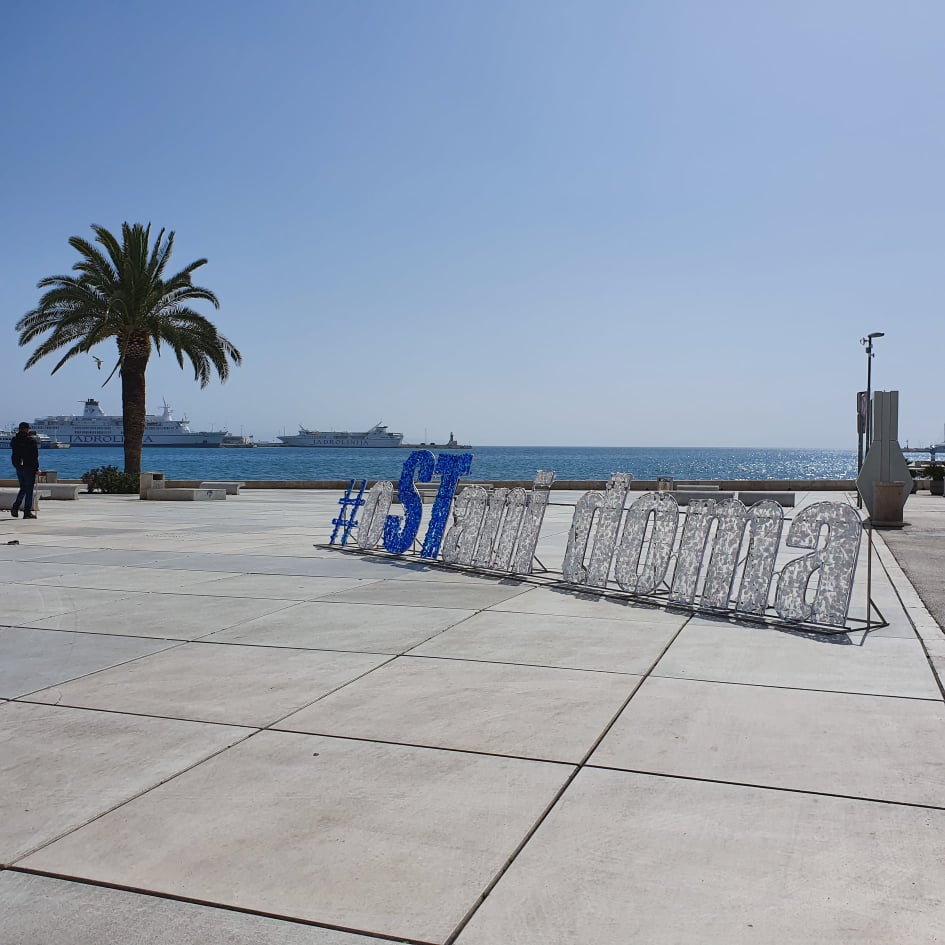
Now compare that to your home country and how they are handling it. What is Croatia doing better/worse?
There is really no comparison possible. I am so sad and mad with the way Romania is dealing with this crisis. The Bucharest government invoked pretty early on the emergency situation and that should have allowed it to take strong measures to restrict movement. But they didn’t, not really. The word to best describe the situation in Romania is chaos.
Medical staff are now resigning in droves in the last couple of days, after getting tired of shouting they do not have adequate equipment or even procedures on how to deal with patients, and rightfully fearing for their and their families’ safety. Medical staff accounts for 20% of the total confirmed cases right now.
As we speak there are 2245 confirmed coronavirus infected persons, and the situation gets worse by the minute. A whole town in Moldova region was just quarantined, after an outbreak at the local hospital. Corruption and incompetence are a daily occurrence in my home country, but now this combination is literally lethal. Combined with the fact that over 200 thousand Romanians have returned home from Italy, Spain or UK from the beginning of this month and many of them did not respect the isolation, I fear Romania is going to follow Italy’s scenario.
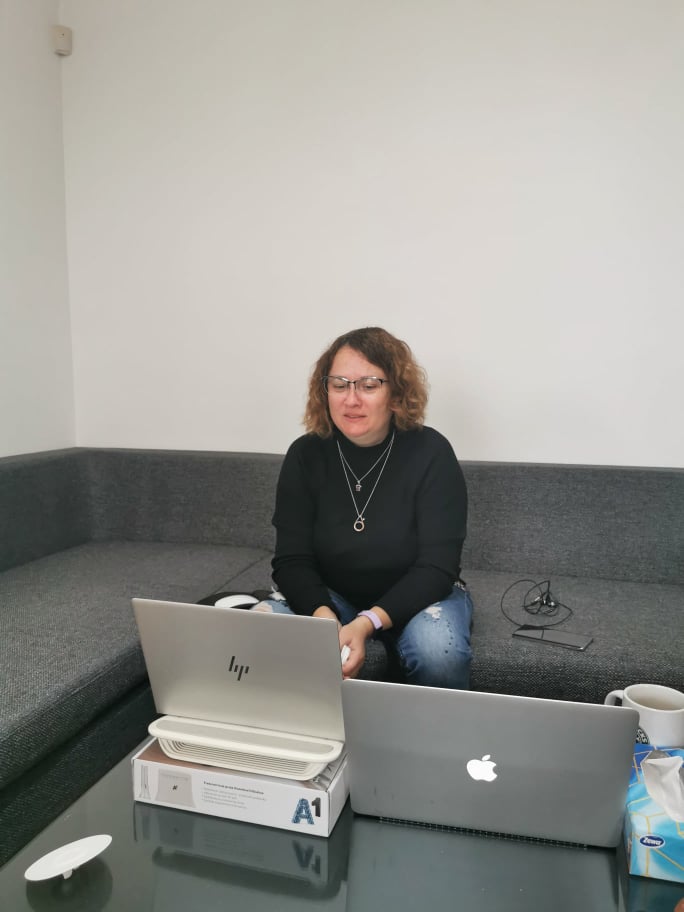
(The realisation of what lay ahead)
What about official communications from the authorities, compared to your home country?
It almost sounds crazy, but I feel so much better informed in a country whose language I still do not speak (TCN has a lot to do with that, as well as Slobodna Dalmacija which I refresh 20 times a day and read with Google Translate).
If someone writes a crisis communication manual after this is over, they will have to give Croatia as the prime example on how this has to be done. As a former journalist and political communications manager, myself, I am beyond impressed. We get all information in a clear manner, twice a day (once a day now), directly from the horse’s mouth, so to speak. The fact that they set up a 113 special coronavirus hotline and a website which now is also partly translated in English, the fact that minister Beros and also Mrs. Markotic do live Q&A sessions on Facebook and the fact the government is sending official info on Viber, that shows they totally understood the need for clear communication and used all tools available in this digital era.
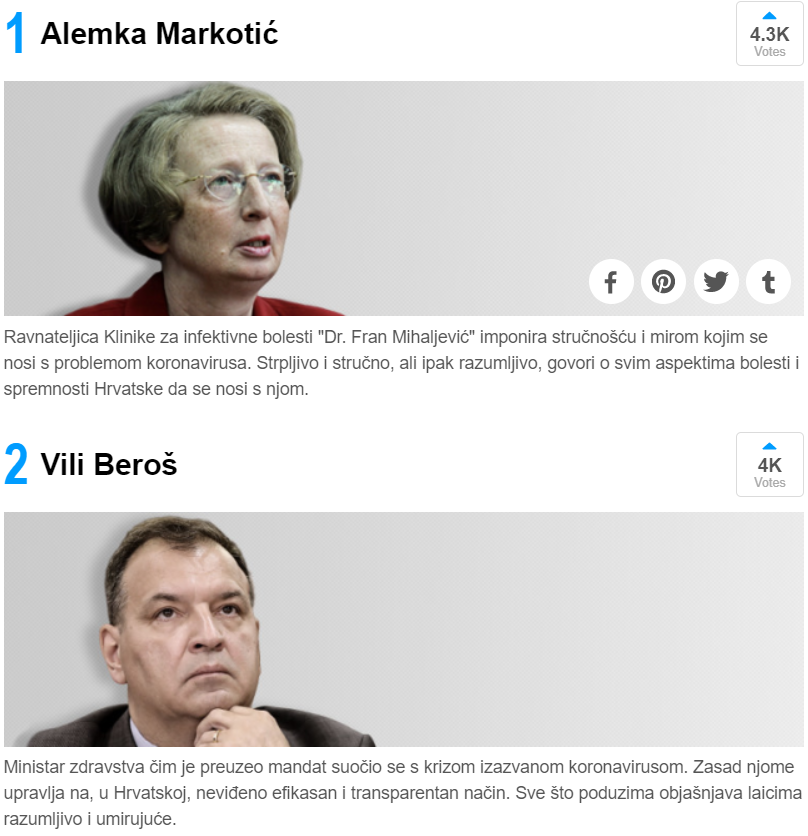
Unfortunately, Romania is at the other end of the spectrum on this, with indecisive action and poor and confusing communication. I will give you just one example, because it affects me personally. My mother is 81 and she lives alone (us three daughters are living all abroad, me in Croatia and my other two sisters in Italy and, respectively, in UK). A week or so ago, the government announced that people over 65 can leave their houses only from 11 am to 1 pm. But a few days later, they added that they can also go out in the evenings if they have dogs they need to walk. And, in case they need to go to the doctor or something else urgent, they can go out at any time during the day. Basically, they pretty much can go out just between 11-13, and also anytime. I would laugh, if it was not actually tragic, since we have a hard time convincing mum to just stay home.
And that is just a small, small example. A week or so ago, they issued an order forbidding local authorities to communicate the local number of cases. They basically decided to stop giving information about the number of cases in each county. The lack of transparency breeds paranoia and lack of trust in authorities, at a time when this is needed more than ever. I am watching from afar, hoping each day they will sober up and start doing the right things, the right way.
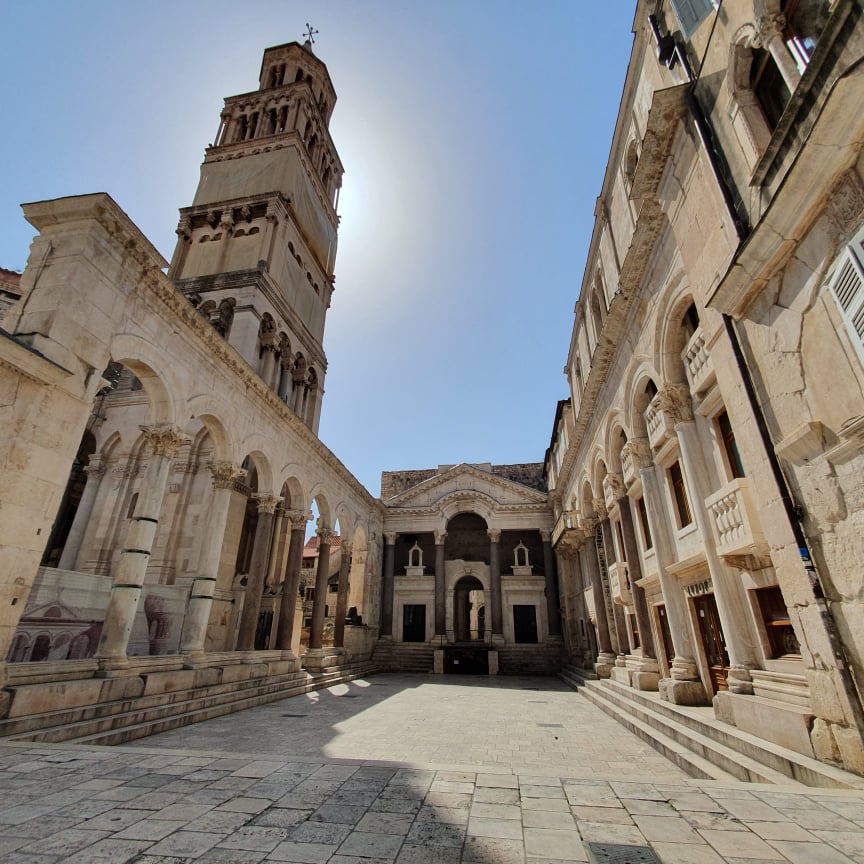
What's the one thing you wish you had taken with you into self-isolation.
My mum.
One thing you have learned about yourself, and one thing you have learned about others during this crisis.
I have learnt that cooking is my crisis/isolation coping mechanism. I usually like to cook when I have time, but since we are at home with basically no work to do, it is the main thing that refills my sanity level back up. We will come out of this with empty pockets, but a few kilos more (although I would have preferred it the other way around).
I cannot say I necessarily learnt new things about others, but I do feel more connected with friends and family, than ever before. The pause we are getting now, forced by the situation, makes us all, I guess, re-evaluate priorities and look at our lives in a new perspective. I cannot imagine our lives being again exactly the same as they were a month ago.
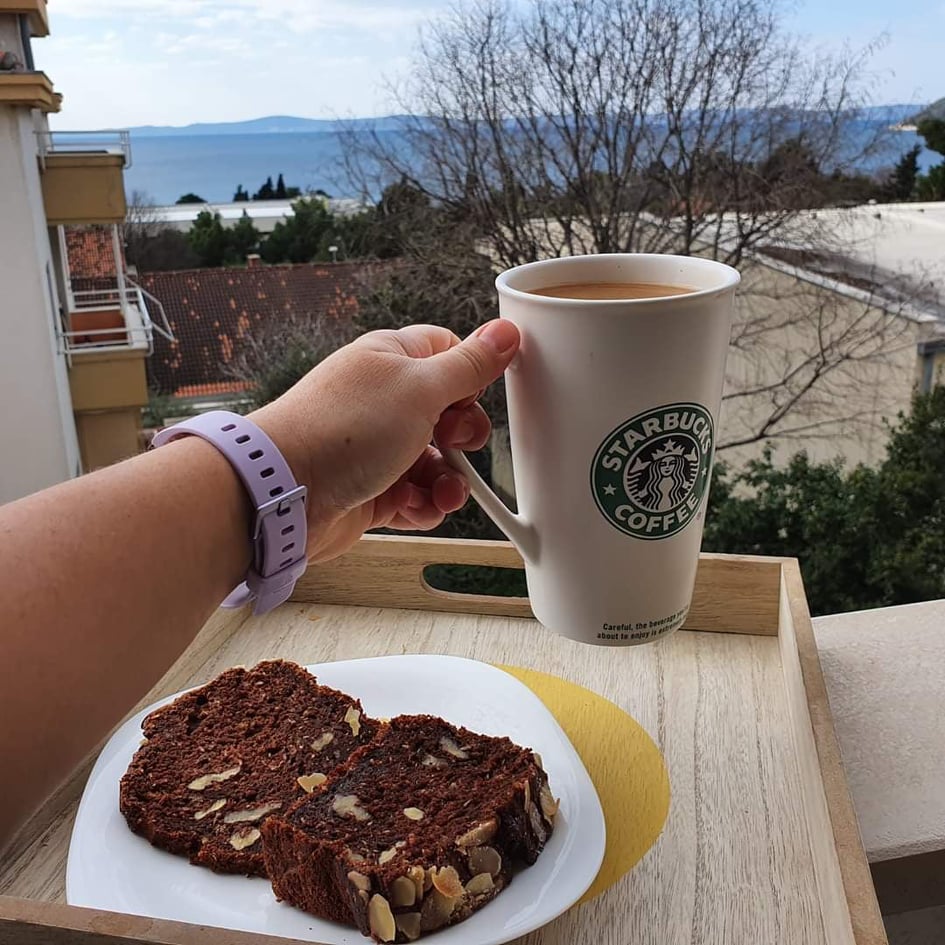
You can learn more about Mirela Rus and her wonderful Breatktime nautical jewellery business in our feature on her in the Foreign Entrepreneurs in Croatia section.
Thanks Mirela, stay safe and see you on the other side.
TCN is starting a new feature series on foreign experiences of sitting out covid-19 here in croatia compared to their home country. If you would like to contribute, the questions are below. Please also include a para about yourself and where you are from, and a link to your website if you would like. Please also send 3-4 photos minumum to This email address is being protected from spambots. You need JavaScript enabled to view it. Subject Corona Foreigner
If you would be interested to record a video version for our partners www.rplus.video please let us know in the email. Thanks and stay safe.
Foreigners Self-Isolating in Croatia: Do You Feel Safer Than in Your Home Country?
Firstly, how are you? Are you alone/with someone? Tell us a little about your situation and sanity levels.
What do you think about the economic measures the government is taking, are they helping your business? (PLEASE IGNORE IF THIS DOES NOT AFFECT YOU)
When did you realise that corona was going to be a big issue?
What is your impression of the way Croatia is dealing with the crisis? How safe do you feel?
Now compare that to your home country and how they are handling it. What is Croatia doing better/worse?
What about official communications from the authorities, compared to your home country?
What's the one thing you wish you had taken with you into self-isolation.
One thing you have learned about yourself, and one thing you have learned about others during this crisis.
TCN has recently become a partner in Robert Tomic Zuber's new R+ video channel, initially telling stories about corona experiences. You can see the first TCN contribution from this morning, my video from Jelsa talking about the realities of running a news portal in the corona era below. If you would like to also submit a video interview, please find Robert's guidelines below
VIDEO RECORDING GUIDE
The video footage should be recorded so that the cell phone is turned horizontally (landscape mode).
There are several rules for television and video news:- length is not a virtue- a picture speaks more than a thousand words
In short, this would mean that your story should not last more than 90 seconds and that everything you say in the report should be shown by video (for example, if you talk about empty streets, we should see those empty streets, etc.).
How to do it with your cell phone?First, use a selfie camera to record yourself telling your story for about a minute and a half. Ideally, it would be taken in the exterior, except in situations where you are reporting on things in the interior (quarantine, hospital, self-isolation, etc.). Also, when shooting, move freely, make sure everything is not static.
After you have recorded your report, you should capture footage that will tell your story with a picture, such as an earlier example with empty streets.
One of the basic rules of TV journalism is that the story is told in the same way as a journalist with his text. Therefore, we ask you for additional effort. Because we work in a very specific situation, sometimes you may not be able to capture footage for each sentence of the report. In this case, record the details on the streets: people walking, the main features of the city where you live, inscriptions on the windows related to the virus, etc.
The same rules apply if you are shooting a story from your apartment, self-isolation, quarantine. We also need you to capture footage that describes your story.
When shooting frames to cover your reports, it is important that you change the angle of the shot (in other words, shoot that empty street from several angles). Also, when shooting a detail, count at least five seconds before removing the camera to another detail.
The material should be about 5 minutes long (90 seconds of your report + frames to cover your story).
After recording everything, send us to Zagreb, preferably via WeTransfer to This email address is being protected from spambots. You need JavaScript enabled to view it.

